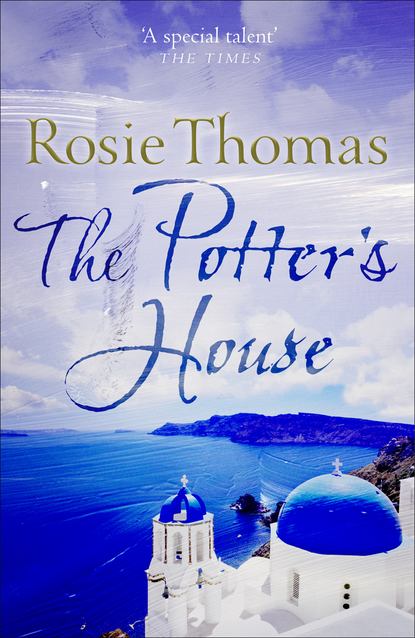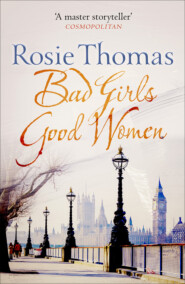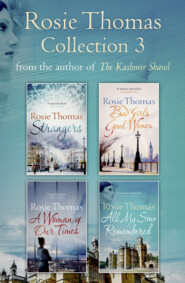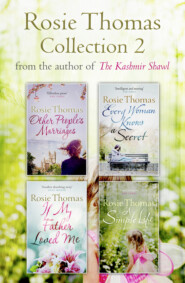По всем вопросам обращайтесь на: info@litportal.ru
(©) 2003-2024.
✖
The Potter’s House
Настройки чтения
Размер шрифта
Высота строк
Поля
That was ten years ago. In that time they had built a business together, and they had had Georgi and Theo.
Meroula put down her empty coffee cup.
‘I will walk back home with you, Mother,’ Xan said, as he always did. Olivia kissed her and Meroula submitted to the embrace.
‘Goodnight Olivia. I am grateful for the food.’
‘And we are thankful for our family.’
It was a traditional island exchange after hospitality given and received. Sometimes Olivia had to grit her teeth around the utterance more than at others.
While Xan was out Olivia finished drying up the supper dishes and put them away in the cupboard. She blew out the candles and went outside to stand on the terrace. The wind was blowing from the wrong direction. Usually at this time of night she could hear the sea, but now she caught a sound from the opposite side, a goat bell from the herd that roamed the hill. She stood for a minute, listening. The goats should be in their shelter now, not restlessly moving. It must be the thunder in the air.
Upstairs the boys were asleep in their beds. Theo’s arms and legs were flung out at angles and he held the red man firmly in one fist. Olivia kissed them both. In her own room she sat tiredly on the bed and peeled off her socks. It had been a long day.
Xan came in and closed the door.
When they were lying down together she asked, ‘What time is it?’
‘Half past eleven.’
‘Did you hear the wind?’
‘Yes. Are you sleepy?’
‘I thought I was. But now I’m not.’
‘That’s good.’
It was an hour before they finally fell asleep, at half past midnight.
Five (#uc5fb50be-85bc-5b9a-ae6c-5df99e1d21a1)
In the darkness I am still clinging to my bed of rock.
I can see Peter’s face and Lisa Kirk’s smile, and Andreas, and my mother and a falling statue.
Againandagain,overandover,thestatue’sstonearccuttingthroughablueafternoon,andtheterrorthatcameaftermergeswiththeterrorofthismoment.
The jetty no longer exists. Even through a hanging pall of dust that thickens the darkness I can see that much. Everything has been transformed. The line of hotels along the beach front has been mashed into drunken, sloping relics. The brittle white façade of my hotel has fallen into creases with stark vertical pillars rising out of it. The corner that had once been my room is completely gone. The tall lights along the sea wall have been snapped like matchsticks and the sand in front is a greedy swirl of water.
I stagger to my feet like a drunken creature.
The jetty foundations are big, jagged boulders and I begin to scramble over them. All I can think is that I must get to the hotel. My belongings are all there, my clothes and my money and passport. Without these coverings and shreds of paper I am nothing, I am invisible.
Get to the hotel. Only a few yards away, but an interminable distance. Blocked by rubble and sea water. I must get to the hotel.
Somewhere ahead of me a woman starts wailing, a long, ululating sound of pure desolation.
Get to the hotel. People will need help.
I hear a booming noise behind me. I turn my head, a split second and out of the corner of my eye I glimpse a towering wall of water. The crest of it with an ugly lacing of foam is far higher than my head and it is racing at me, too fast to evade, even if there were anywhere to run to.
I fling up my arms to cover my head. The wave smashes into me, and my ears and eyes and lungs fill up with water. I fall and the force of the wave sweeps me away like a dead thing, arms and legs useless as I am churned in a soup of stones and sand.
The next thing I know I am lying head down, my torso twisted so I can’t breathe or cough to expel the water from my lungs.
Move. But I am pinned by rocks and the notion flutters in my weary mind: stay still. Let go and then rest.
I gather a knot of strength from somewhere within myself and strike out against the rocks. Somehow I break free of the weight and the sky steadies overhead. I can see stars, pinpricks in the dark-blue span. I am lying among boulders in what was once the garden of my hotel, where the huge wave that followed the earthquake has disgorged me.
It is no longer a garden. Tables and broken beach beds and the snapped stalks of parasols lie in a reeking jumble with sand and mud and a wreckage of fencing and pedalos and torn-up trees. Among the debris, close to my face, is a woman’s body. I can’t see her head, but from the angle of her hips and her stillness I know that she is dead.
I lie with one side of my face in the mud, shivering with fear and cold, and the beginnings of comprehension.
The earthquake must have been massive and devastating. It has not just happened in my head or in the immediate envelope of space surrounding me. The line of hotels is destroyed, the whole of Branc must be in ruins.
Maybe I am the only person left alive.
I must move. Do something.
‘Move.’ I hear my own voice croaking out the word. And in obedience to the command I lever myself on to my hands and knees, and crawl to the woman’s body. She is every bit as dead as she looks. I couldn’t see her head when I first noticed her, because it isn’t there.
I am not the only person left alive. There are shapes awkwardly moving in front of what remains of the hotel and I can hear shouting. Meshed with the shouts are thin, high screams for help. I struggle towards the figures and a shaft of light strikes across the mess in front of me. A man clambers past, dressed in fisherman’s clothes and carrying a big torch, and I struggle in his wake, drawn like a moth to the beam of light. He half turns and shouts a stream of Turkish commands, waving towards the side of the hotel.
‘I don’t know. I don’t understand,’ I shout back. He takes no notice of me at all and another man scrambles past me to answer his instructions.
Belongings and passport. The thought comes back to me and fighting disorientation I veer towards what was once the door to what were once the stairs leading to my room.
Slabs of marble facing and chunks of torn concrete and twisted rods of metal make an impenetrable barrier. There is no entering the building because there is no entry left, and nothing recognisable remaining of this corner of the hotel. Everything has sheared away and toppled into a mess of rubble, and the acrid dust from the collapse hangs in the air like poison gas. I can’t reach any of my possessions because they are buried under tons of masonry. If I had been asleep in my bed, I would be buried there with them. But instead I am outside in the darkness, unable to speak the language of the cries for help I can hear rising all around me. People are stumbling and shouting, and hauling at the wreckage.
I can’t communicate with them. I don’t know what to do. I am invisible.
I sit down in a heap against the spars of what was once the terrace bar. Only yesterday I was perching here on a tall stool, dipping my spoon into an ice cream that – after Andreas – I saw no reason not to allow myself: pistachio and almond ice cream, palest sea-green, speckled with nuts.
Now there is broken glass, a flag of half-buried awning.
The full scale of the devastation is becoming clear. I can read it in the anguished flailing of a man who is tearing handfuls of mud out of a bank of silt washed up against collapsing walls. He is shouting a name, over and over. It sounds like Oma,Oma.
There must be scenes like this all over Branc, and how far beyond that?
There are more people now and bobbing lights weaving across the ruined garden. The beams swing across a woman who is standing alone, screaming at the sky, her fists clenched above her head. They light up a man’s face, caked with grey dirt and blotted with blood. In another place I see a knot of men with garden spades who have begun to dig at the mud bank. The man in fisherman’s clothes is pointing and shouting directions but he is the only one who seems capable of organising any rescue attempt. And in the face of this devastation, rescue of any sort seems an impossibility.
Help. Sluggishly, my reactions impaired by shock, it dawns on me afresh that I should also try to help someone. Once I am on my feet I move clumsily towards the nearest light. A woman in a torn and bloodied nightdress is crouching over the wreckage of the bar. I can see her hair hanging forward in a grey coil over her shoulder, and the filth caking her wrists and arms, because there is a girl of about twelve holding a tiny torch with the narrow beam shining on her. The woman is muttering and frenziedly hauling at a painted pole that once supported the bar canopy.
I shout at her, ‘I’ll help. Who is in there?’ but she is too intent to hear me. The girl stands her ground, shivering and sobbing. When the pole comes loose the woman throws it aside without even noticing the weight. She kneels down and peers into the space and then doubles her efforts to haul away the rubble. Her hands are bleeding, but she is oblivious.
I can see a third hand, curled in the dirt.











